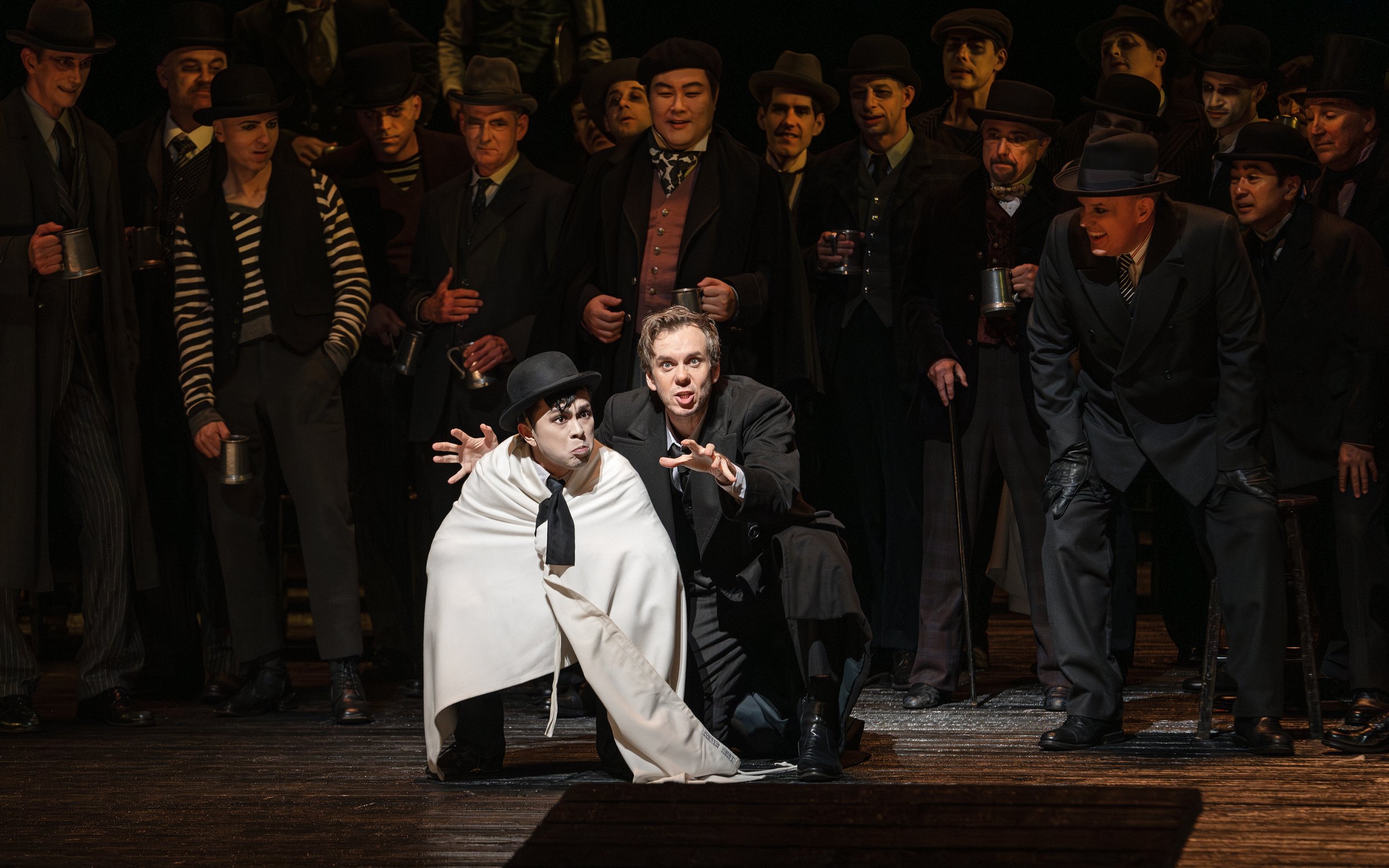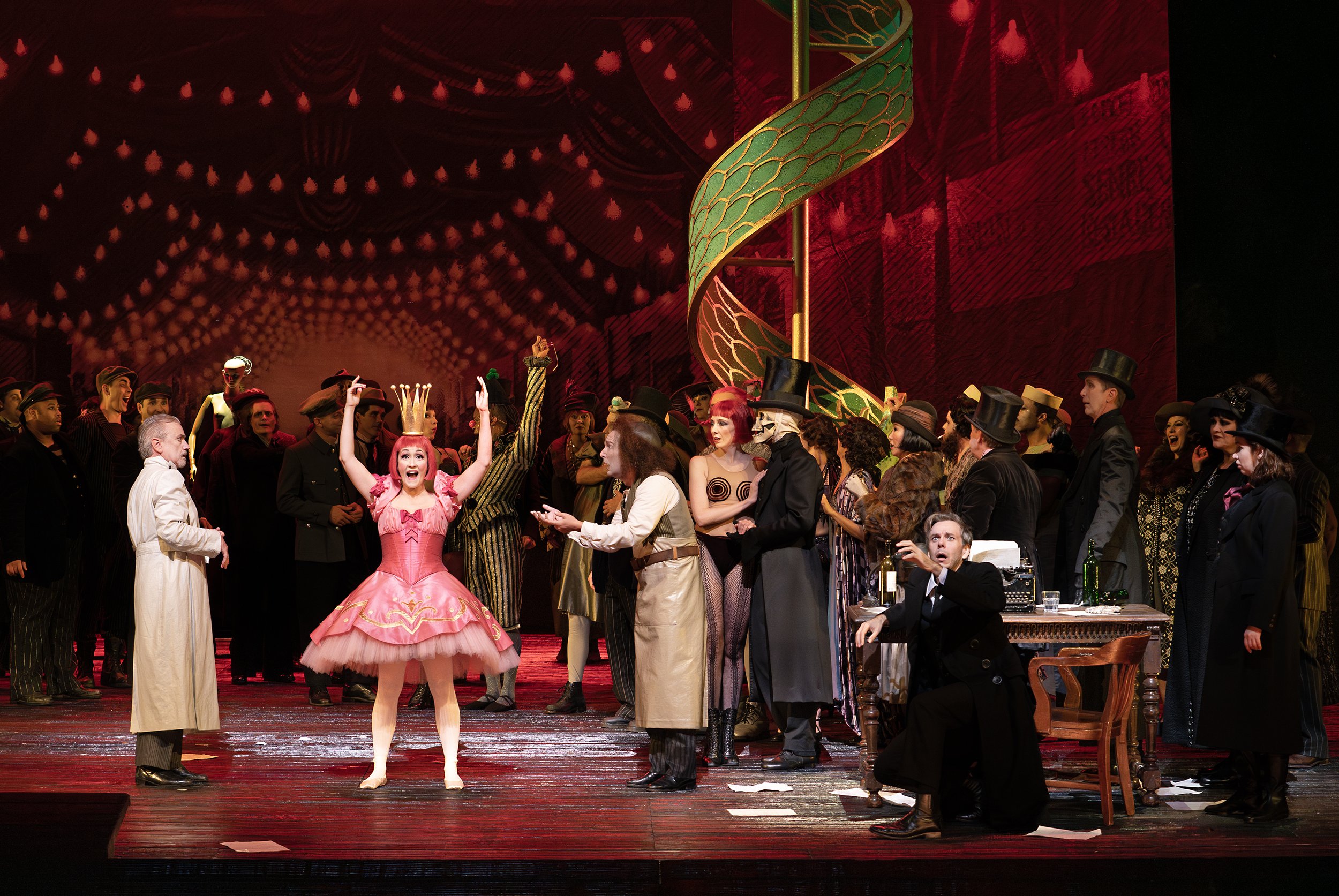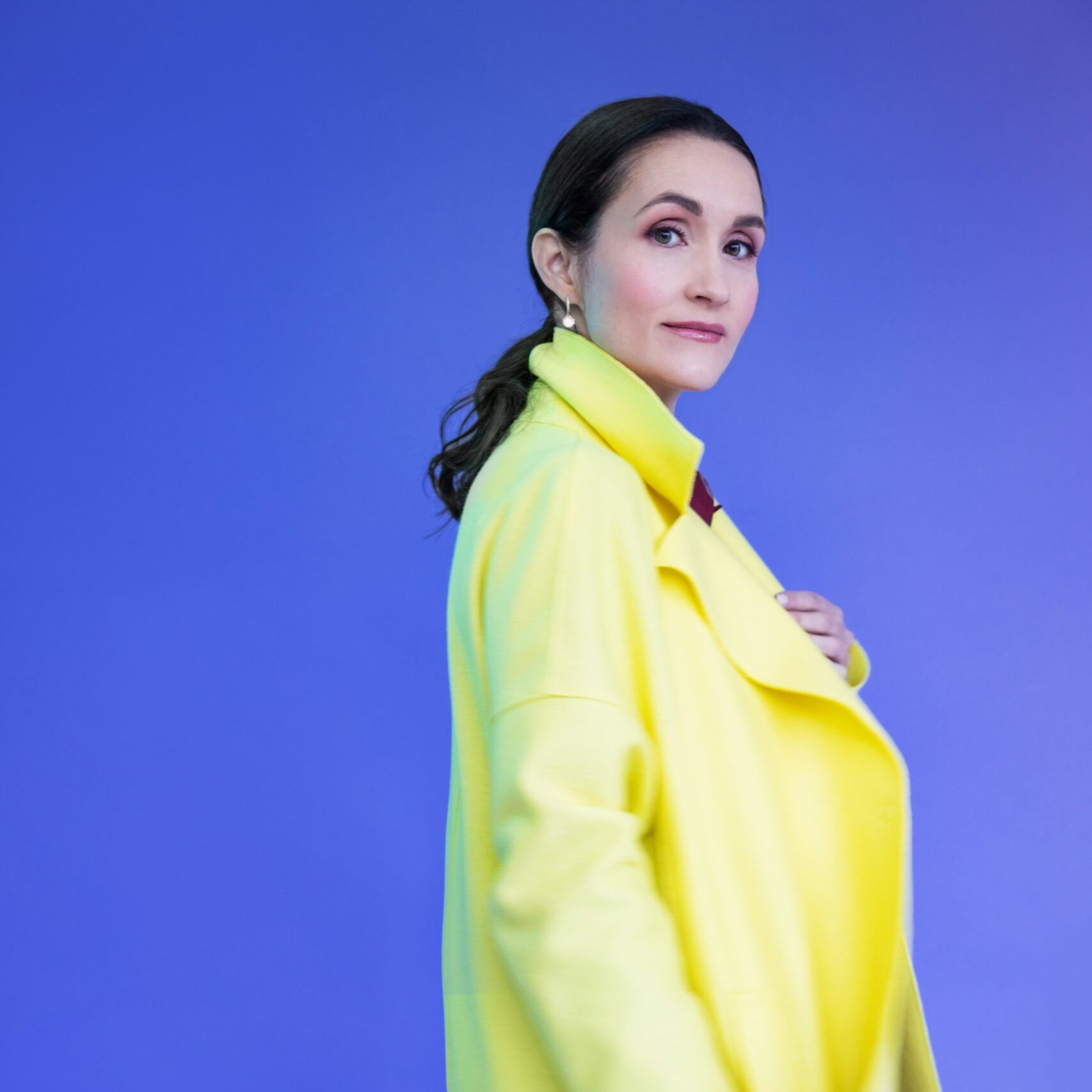Met Opera 2024-25 Review: Les Contes d’Hoffmann
Benjamin Bernheim with the Met Chorus and an Actor (Karen Almond/Met Opera)
Jacques Offenbach‘s Les Contes d’Hoffmann is opera’s equivalent of The Tortured Poets Department, only 14,592 times better. The music brims with kaleidoscopic vibrancy and the story of Hoffmann’s three loves is delightful, though dizzyingly strange at times. Hoffmann was the first opera from the classical repertoire to grace the Met stage this season, and it has a smashing lineup of singers; even the smallest roles are luxuriously cast, but let’s start with the title role.
Benjamin Bernheim in Les Contes d’Hoffmann (Karen Almond/Met Opera)
As E. T. A. Hoffmann, perhaps best known as the author of the Nutcracker story, Benjamin Bernheim once again gave a masterclass in French opera. As might be expected from a native of Paris, his French is a dream, and he extracts every ounce of beauty from the gorgeous score with his sublimely lyrical singing without going over the top. He exhibited technical mastery and secure high notes while still having a grand time. “Il était une fois à la cour d’Eisenach” was huge fun, and Bernheim relished every “crick-crack,” even if the song about the dwarf Kleinzach smacks of ableism. New century, new standards. I can’t wait to see what Bernheim has in store for us next season.
Erin Morley, Vasilisa Berzhanskaya, and Benjamin Bernheim in Les Contes d'Hoffmann (Karen Almond/Met Opera)
There is usually a danger that an aria as well known as “Les oiseaux dans la charmille,” the Doll Song, will become stale, but not with Erin Morley. She has been singing the role of the doll Olympia for almost ten years now, without the law of diminishing returns daring to touch her. She effortlessly nailed every one of her specialty coloratura runs as well as the comedy, walking and even curtsying in a charmingly mechanical way. Other than the Doll Song, Olympia sings only “Oui, oui” multiple times, but Erin made even that a delight. One wonders what future directors will make of Olympia given the rise of AI, which I don’t like to even think about (nor do I write with it). I’m happy for her to stay Coloratura Barbie.
Pretty Yende in Les Contes d’Hoffmann (Karen Almond/Met Opera)
Pretty Yende has not been at the Met since La Fille du Regiment in 2019, and I’ve been anxiously awaiting her return every season since. She was my first favorite opera singer, so I was understandably ecstatic when she was announced to be singing this season. As Antonia, an opera singer with a weak heart who sings herself to death, she took a little time to warm up — the achingly melancholy aria “Elle a fui, la tourterelle,” is the very first thing that comes out of her mouth —, but it wasn’t long before I was again under the enchantment of her unfailingly mellifluous voice, full of irresistible sunniness and winsome innocence. Pretty also delivered on her second assignment: Hoffmann’s latest love, the opera singer Stella, who she played with confident coquettishness.
Benjamin Bernheim, Christian Van Horn, and Vasilisa Berzhanskaya in Les Contes d'Hoffmann (Karen Almond/Met Opera)
Vasilisa Berzhanskaya’s Met debut augured an exciting future. The role of the Muse of Poetry/Nicklausse gave a tantalizing glimpse of the mezzo’s impressive upper range — she was a soprano during her early career and even sang the high-flying Queen of the Night —, and she displayed great self-assurance for a débutant. Her imitation of Olympia getting stalled in mid-song had the house in stitches. The Muse (disguised as Nicklausse) is onstage pretty much the entire time, spying on Hoffmann’s dates and conspiring with the Villains, but Vasilisa never looked like a third wheel. Her character’s motives, however, were murky at times; she wants to get Hoffmann away from romance so he can focus on poetry, but why does she help Dapertutto steal Hoffmann’s reflection?
That, of course, was the director’s rather than performer’s choice. Bartlett Sher’s production suffers from a surfeit of ideas, few of which advance the story. The pleasingly minimalistic Act 2 is the only one that is not overcrowded, but we don’t need to see Stella in the prologue during her diva performance of Don Giovanni (as much as I love having Pretty onstage); we don’t need a winding staircase dully revolving on the side of the stage in Act 1 without anyone setting foot on it; nor, in the same act, do we need five more Olympias or a chorus line of provocatively dressed Actors at Spalanzani’s party. When Coppélius claims to sell “eyes that show you what you want to see,” he takes out jars of eyeballs instead of eyeglasses before finally giving a single pair of spectacles to Hoffmann. It insults the intelligence of the audience.
Having never seen Les Contes d’Hoffmann before, I was especially looking forward to the Barcarolle, which opens Act III. It is a classic love duet between Nicklausse and the courtesan Giulietta which even those who have never been to the opera are likely to know, as it has featured in films like Life is Beautiful, Midnight in Paris, and Margaret, as well as TV series like Gilligan’s Island. When the orchestra played the familiar opening notes, echoing the gentle rockings of a gondola (since Act III is set in Venice), I beamed with excitement. Unfortunately, when the curtains opened, I was immediately disappointed. Clémentine Margaine, in the role of the courtesan Giulietta, was wearing an opulent dark red gown, but she was surrounded by ladies making out in small black bikinis. I tried to focus on Clémentine and Vasilisa, who attempted valiantly to preserve the scene’s beauty through their singing, but it was hard to reconcile the elegance of the music with the stage action. Companies should be trying to make opera more accessible for children, not less. Hoffmann could be such a nice holiday opera.
On a historical note, courtesans serviced and mingled with the wealthy elite. They were not common strumpets, and the two would not have mixed. Violetta Valèry, another operatic courtesan, wouldn’t be caught dead in a brothel. Plus, the courtesans’ pannièred gowns appeared to be mid-18th century, whilst bikinis were invented in 1949, although Stella’s pink dress looks vaguely 1920s to early 1930s. (The real E. T. A. Hoffmann lived from 1776-1822.) That’s another problem with the staging; it’s historically all over the place, not even settling on a single century.
Clémentine Margaine and Benjamin Bernheim in Les Contes d’Hoffmann (Karen Almond/Met Opera)
Even amidst the crassness of the environment, Clémentine Margaine glowed as a gracefully sensual Giulietta. Her burgundy-hued voice is full-bodied, plush, and unusually large, and she has long since mastered the throwaway magnetic glance. It would be easy to turn Giulietta, who the villain Dapertutto convinces to steal Hoffmann’s reflection (soul) in exchange for a diamond, into a heartless Delilah, but Clémentine portrayed her as touchingly guilt-ridden even whilst seducing Hoffmann. Before this, she has been limited to singing Carmen at the Met — in which I can attest she excels —, but it is clear that her talents deserve to be seen in a wider repertory. I hear there may be a Role for her in a future Met season.
As the Four Villains, Christian Van Horn unleashed his pitch-perfect evil laugh, which he’s apparently worked on for two-plus decades. He brought menace to the stage, which he easily commands with vocal authority and considerable height. There did not, however, seem to be much difference between the villains; I got the impression that they were really just four of Lindorf’s personas (the prologue/epilogue villain).
From left: Tony Stevenson, Erin Morley, Aaron Blake (with yarmulke), Alison Clancy, Benjamin Bernheim, and Vasilisa Berzhanskaya in Les Contes d'Hoffmann (Karen Almond/Met Opera)
Eve Gigliotti, one of the Met’s most indispensable supporting singers, made the most of her cameo as Antonia’s mother. Aaron Blake played all of the Four Servants: in this production, bumbling comic figures with a stooped gait and jerky movements. During Act I, in which Blake was Cochenille, I noticed a cloth of some sort on the back of his head suspiciously resembling a Jewish yarmulke. I hate to think that the Met made a character who is already depicted as an idiot a Jew for no reason, and I would be glad to be proven wrong, but if that’s not a yarmulke, I don’t know what is. Offenbach would turn over in his grave; he was a Jew himself, the son of a cantor. There’s a character named Schlémil, for pity’s sake (schlemiel is one of the many words for idiot in Yiddish), sung by Jeongcheol Cha. This was not in the production’s 2015 HD, and directors rarely oversee revivals, so I doubt Sher is to blame, or Blake, who sang solidly and received an especially hearty round of applause for his hilarious aria “Jour et nuit je mets en quatre” in Act 2, in which he played Frantz.
As splendid as the singing is, it would take another cast at least as good as this one to lure me back to see this production. Otherwise, once is enough; I’ll stick to the radio for the last performance, which is this Friday. If you don’t mind decadence, catch it while you can.
Les Contes d’Hoffmann runs through October 18.










